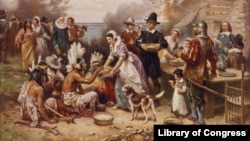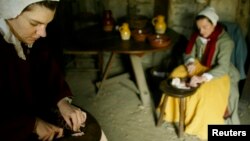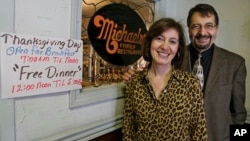This week, Americans celebrate one of the country's oldest and most cherished traditions – Thanksgiving. VOA Senior Analyst Victor Morales examines the history of this quintessential American holiday and what it means in the 21st century.
Four centuries ago, bands of dissenters set sail from England to the New World in search of religious freedom. One group of Protestant worshipers arrived in what is now Plymouth, Massachusetts in late-1620.
They suffered great hardships during their first winter in America. Nearly half of them starved or froze to death. But with help from the Native Americans, the Pilgrim colonists learned what foods to eat and how to build homes to withstand the elements.
Thanksgiving Confusion
That first "thanksgiving" was a harvest festival in the autumn of 1621 – less than a year after the colonists arrived. It's thought that some 50 Pilgrims and 90 Indians attended the celebration, and ate many of the same foods Americans now consider traditional Thanksgiving fare – including native vegetables and roasted turkey.
But for the colonists, that first celebration was more secular than it was religious. For the most part, the three-day event was one of feasting and games. And it was never repeated.
A party to give special thanks to God would have been unthinkable for the strictly religious colonists, or Puritans, as they were often called, who focused their energies on the Christian Sabbath, not on “man-made” days of worship. In fact, the first thanksgiving observance to be declared by the Pilgrims occurred in the summer of 1623 to give specific thanks to God for ending a drought, and it was a relatively somber event.
Pilgrims picked as 'original Americans'
So what accounts for the Thanksgiving confusion?
"We need a history that's going to represent the righteousness of the American way,” said historian John Kemp, colonial training specialist at Plimoth Plantation in Plymouth, Massachusetts. Intellectuals of the mid-to-late 19th and early 20th centuries “picked out the Pilgrims because they seemed a little more 'American' than anyone else. And they seemed better than others,” said Kemp. “If you look at Jamestown [Virginia], which, in fact, was the first English colony – well, those guys had slaves. And in the Victorian period [beginning in the mid-1800s], the slave states in the U.S. were seceding [from the Union just prior to the Civil War] and stirring-up nasty things. So you didn't want your 'original' Americans to be Jamestown settlers.
"And then when you looked at New England, the people up in Boston had persecuted Quakers and actually put some of them to death and burned people they accused of being witches. The Plymouth people had never done that. Therefore, people such as Henry Wadsworth Longfellow, Daniel Webster, people who were writing school books, and artists, but mainly people in the Boston area – a lot of historians at that time had a Harvard University pedigree – built-up this whole notion that America came from the Mayflower [the Pilgrim's ship] and the Pilgrims," Kemp said.
The meaning of Thanksgiving
The Victorian image of Thanksgiving served not only as a mirror on the nation's past, but also as a window through which Americans viewed their destiny. But many historians are quick to point out that by the end of the 19th century, most of America's Indians had been forced to live on reservations, and that religious tolerance and racial equality were still decades away.
And critics argue that today, Thanksgiving often means little more than watching football games, over eating and the beginning of the Christmas shopping season.
Boston-based historian and cultural education consultant Solomon Davidoff, whose Jewish ancestors emigrated to the United States from Eastern Europe, said Thanksgiving, nonetheless, remains an important part of American culture.
"If you look at the influx of immigrants to the U.S., especially in the late-1800s and early-1900s, when Thanksgiving as a national holiday was really getting its start – along with July 4th [U.S. Independence Day] – it was seen as the quintessential American holiday,” said Davidoff.
“So definitely, you can see that there is more of an observance of Thanksgiving in being a day for those who have emigrated to the United States to give particular thanks for the United States' existence," he said. "When I was a child, I had friends who wondered, 'Do you celebrate Thanksgiving?' And we would say, 'Yes,' because we are Americans and we have pride in this country and in what this country is and in what this country has done for us."
Special meaning for immigrants
Because Thanksgiving was first observed by immigrants, I wanted to get a better idea of what it means to people from other lands who have settled in America. I asked some of my colleagues here at the Voice of America what Thanksgiving means to them.
“I come from a Buddhist tradition. We don't have 'God' and we don't have 'God' to thank,” said Nittaya Maphungphong of VOA’s Thai Service. “But having been in this country for so long, Thanksgiving gives me a chance to pause and reflect and to be really thankful for all of the things that I have right now – my friends, my job, my family, my dogs. What else can I say?" said Maphungphong.
“To me, Thanksgiving is the first opportunity to celebrate family and friends outside of religion,” said Maria de los Angeles Franco of VOA’s Spanish Branch. “It is a chance to say 'thank you' to them for their existence, for what they do for you, and for what they mean to you," said Franco.
As for me, Thanksgiving has several meanings. I take pause to thank God for my family and friends, and for all that I have received during the past year. But I also remember the Pilgrims who had the courage to come to this land to practice their faith freely, and the millions of people from all over the world who have come to the United States since that time and made our nation strong.
Like most people born here in the United States, my ancestors are from somewhere else – in my case, from Europe and Latin America. And today, I'm thankful that I can wish all of you the peace, prosperity and freedom that this Thanksgiving Day has come to represent for so many Americans.







